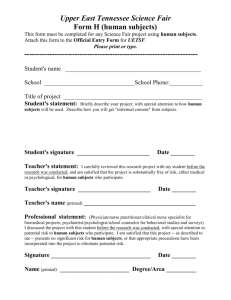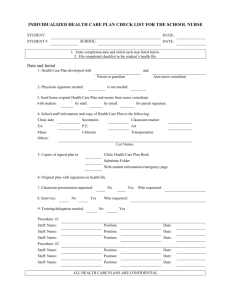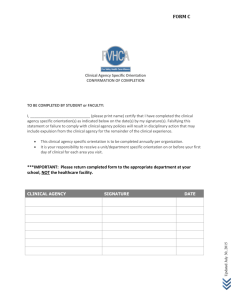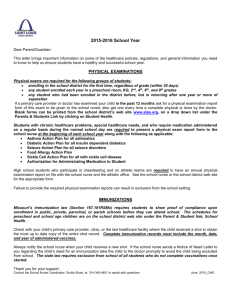What is it?
advertisement
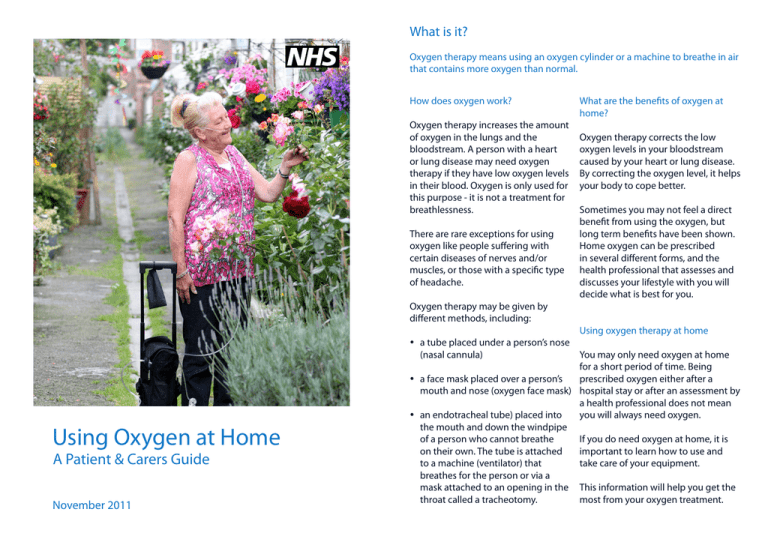
What is it? Oxygen therapy means using an oxygen cylinder or a machine to breathe in air that contains more oxygen than normal. How does oxygen work? Oxygen therapy increases the amount of oxygen in the lungs and the bloodstream. A person with a heart or lung disease may need oxygen therapy if they have low oxygen levels in their blood. Oxygen is only used for this purpose - it is not a treatment for breathlessness. There are rare exceptions for using oxygen like people suffering with certain diseases of nerves and/or muscles, or those with a specific type of headache. Oxygen therapy may be given by different methods, including: Using Oxygen at Home A Patient & Carers Guide November 2011 What are the benefits of oxygen at home? Oxygen therapy corrects the low oxygen levels in your bloodstream caused by your heart or lung disease. By correcting the oxygen level, it helps your body to cope better. Sometimes you may not feel a direct benefit from using the oxygen, but long term benefits have been shown. Home oxygen can be prescribed in several different forms, and the health professional that assesses and discusses your lifestyle with you will decide what is best for you. Using oxygen therapy at home yy a tube placed under a person’s nose (nasal cannula) You may only need oxygen at home for a short period of time. Being yy a face mask placed over a person’s prescribed oxygen either after a mouth and nose (oxygen face mask) hospital stay or after an assessment by a health professional does not mean yy an endotracheal tube) placed into you will always need oxygen. the mouth and down the windpipe of a person who cannot breathe If you do need oxygen at home, it is on their own. The tube is attached important to learn how to use and to a machine (ventilator) that take care of your equipment. breathes for the person or via a mask attached to an opening in the This information will help you get the throat called a tracheotomy. most from your oxygen treatment. After your doctor/nurse prescribes oxygen, there are a few things to know about using oxygen at home. Basic instructions If you use nasal cannulae (prongs): yy Do not light candles, lanterns, fires, and cookers or smoke while you are wearing your oxygen. There is a serious risk of fire or burns. yy Wash the nasal prongs with soap and water once or twice a week. Follow the manufacturer’s instructions on caring for your equipment. yy Do not change the setting on your oxygen without talking to your doctor/nurse or member of the Oxygen Team first. Turning the flow rate up or down could put you in danger. yy Keep track of how much oxygen is in the cylinder/tank (in case you are not on an oxygen concentrator – a machine that plugs into an electric socket), and order in advance so you don’t run out. yy Replace the prongs every two to four weeks. If you have a cold or the flu, change them when your symptoms pass. Your home oxygen supplier can provide this for you. yy Use a water-based moisturiser (such as KY Jelly or similar) on your lips and in your nose to prevent drying and cracking. Read labels, and look for a product that lists water as the first ingredient. yy Do not drink alcohol or take drugs yy Do not use petroleum-based that relax you, such as sleeping pills, products (such as Vaseline sedatives or recreational drugs, petroleum jelly) as these can plug while using oxygen. They can cause the air holes and are also a fire you to breathe too slowly. hazard and can potentially cause chemical burns. yy Call your GP if you feel: - increasingly short of breath yy Put a piece of gauze under the - restless or confused tubing to keep the skin behind your - have early morning headaches ears from getting sore. - very tired. Is it safe to use oxygen at home? working order (the local fire service can advise you and supply you with them). YES. However, you must use it safely. Oxygen is a fire hazard. Follow safety measures to keep you and your family/ yy If you have portable (ambulatory) carers safe. oxygen, make sure you have an oxygen sticker for your car yy Never smoke or let anyone else (available from the Fire Service) in smoke while you are using oxygen. case you are in an accident, and ask Put up no smoking signs, and be your oxygen supplier about safe aware of people smoking near you transport of your oxygen. if you are using your oxygen outside of your home. Will I become dependent on oxygen? yy Keep oxygen at least six feet (two metres) away from flames or NO. You have been prescribed oxygen heat sources such as gas cookers, as you have low blood oxygen levels. paraffin or gas heaters, candles, You will be advised on how many cigarettes, cigars and fireplaces. hours per day you need to use it. However if you want to go out or yy Do not use flammable products, have a short time away from home, such as cleaning fluid, paint it will normally be alright to come off thinner, petroleum based creams the oxygen for a while. Sometimes or aerosols, while you are using you may be prescribed oxygen to oxygen. use outside of the home. You will not become dependent on oxygen, and it yy Keep a fire extinguisher at home will never lose its useful effects. within easy reach. yy Keep oxygen cylinders upright. Make sure they do not fall over and get damaged, especially when travelling in a vehicle. Ask your supplier for transport box. yy Inform your local fire station that you have oxygen at home. They advise on keeping safe. yy Ensure you have smoke/fire alarms within your home that are in Will I have to be treated with oxygen forever? Every person is different and it is impossible to tell if you will always need oxygen therapy. Blood tests look at the amount of oxygen you have in your blood. This tells us if you need more or less oxygen, or if it can be stopped and removed from your home. Can I have too much oxygen? Can I travel if I have oxygen? YES. It is important to attend any YES. Plan in advance to make sure your oxygen review appointments or speak trip goes well: to your GP/Nurse if your oxygen needs have not been assessed in the last 12 yy Talk to your GP for advice on if months. you’re safe to travel, and what you need to do to stay safe while Oxygen is a prescribed drug that all travelling. Get at least one copy of patients must be carefully assessed for. your Home Oxygen Order Form It is not true that oxygen can cause no (HOOF), along with your usual harm. Only a small number of people medication, to take with you on who have been assessed will need the trip. If travelling abroad, have oxygen prescribing and benefit from an early discussion with your GP or it. People who take oxygen when they community nurse. do not have low oxygen levels in their blood may get several short and long yy Travelling with oxygen can be done term harmful effects such as loss of if you plan ahead. Before the trip, independence, muscle wasting and tell the travel company that you use an increase of carbon dioxide levels in oxygen. Do this well in advance, as the bloodstream, and as the breathing they may have requirements that may become poor this may become can take some time to arrange. life threatening. yy Travel insurance is essential when If you are worried that you or travelling with oxygen. The British someone you know has been given Lung Foundation and the British oxygen without a proper assessment, Heart Foundation can provide a list please contact your GP or member of of companies that insure travellers the Oxygen Team. If you were given with oxygen. oxygen to take home when you were poorly in hospital, you need to be yy Tell your oxygen supplier about assessed again. You may be taking your plans, as it may be possible to oxygen unnecessarily and risking have oxygen delivered directly to harmful side effects. your destination. You will need a copy of your HOOF for this. Where to go from here Now that you have read this information, you are ready to start using oxygen at home. Talk with your GP or nurse If you have questions about this information, take it with you when you visit your healthcare professional. You may want to mark areas or make notes in the margins where you have questions. Contact details: yy Community Specialist Nurse: ______________________________________ ______________________________________________________________ yy Air Products: 0800 373 580 yy British Lung Foundation: 0845 850 5020 (Monday - Friday, 10am - 6 pm) www.lunguk.org yy British Heart Foundation: 0300 330 3311 (Monday - Friday, 9 am - 5 pm) www.bhf.org yy Expert Patients Programme: 0800 032 6016 If you have a community matron or district nurse, remember to ask them if you have any queries or concerns about your oxygen. Produced by NHS BEN & HoEFT Project team as part of the Department of Health Lung Improvement Project. For details contact Yvonne Richards. Email: y.richards@nhs.net Designed by the Communications & Engagement department, Birmingham & Solihull Cluster (Ref: BCS.1011.1183) Tel: 0121 255 0875 Email: bham.solihull@nhs.net PATIENT AGREEMENT FOR THE SUPPLY OF OXYGEN AT HOME The purpose of this agreement is to help communication and prevent misunderstanding about your oxygen therapy. The treatment you are taking is to improve your oxygen blood levels. It is your responsibility to report your use of the oxygen and how it is affecting you accurately. It is the responsibility of your GP or other healthcare professional to provide other options that will improve your breathing. Form issued by: Unit/practice name: _________________________________________________ Unit/practice address: _______________________________________________ __________________________________________________________________ ______________________________________ Postcode: ___________________ Contact telephone number: __________________________________________ Patient’s details: Patient’s name: _____________________________________________________ Patient’s home address: ______________________________________________ __________________________________________________________________ ______________________________________ Postcode: ___________________ Date of Birth: ____/____/__________ NHS number: ______/_______/_______ Patient’s telephone number: __________________________________________ yy I understand that my oxygen requirements may change and adjustments to my prescription may be necessary, including the oxygen being stopped and the equipment being removed from my home. yy I will communicate fully with my healthcare professional about the character and intensity of my condition, the effect of the treatment on my daily life, and how well the oxygen therapy is helping. yy I have the right to have my condition checked regularly and my treatment adjusted as appropriate. yy I have the right to stop my treatment, but I must consult with my GP first. yy I will not share my oxygen therapy with anyone. yy I will safeguard my oxygen from loss or theft. Lost or stolen cylinders may not be replaced. yy I agree that I will use my treatment at a rate no greater than the prescribed rate. yy I agree to my healthcare professional informing the Fire Service that I am a home oxygen user for safety purposes. yy I will allow the oxygen supplier to enter my home to maintain their equipment or change prescribed oxygen rates. yy I will allow my oxygen to be collected from my home once my GP/nurse decides the treatment is no longer necessary. I agree to follow these guidelines that have been fully explained to me. My questions and concerns regarding treatment have been adequately answered. A copy of this document has been given to me. Patient’s signature: _________________________ Date: ____/____/__________ This agreement is entered into on: ____/____/__________ I confirm that I am the healthcare professional responsible for the care of this patient and I have completed this form on his/her behalf as he/she is unable to provide/withhold consent. Patient’s signature: _________________________________________________ Name: (PRINT)______________________________________________________ GP/healthcare professional signature: __________________________________ Signature: ________________________________ Date: ____/____/__________ Carer’s signature: ___________________________________________________
